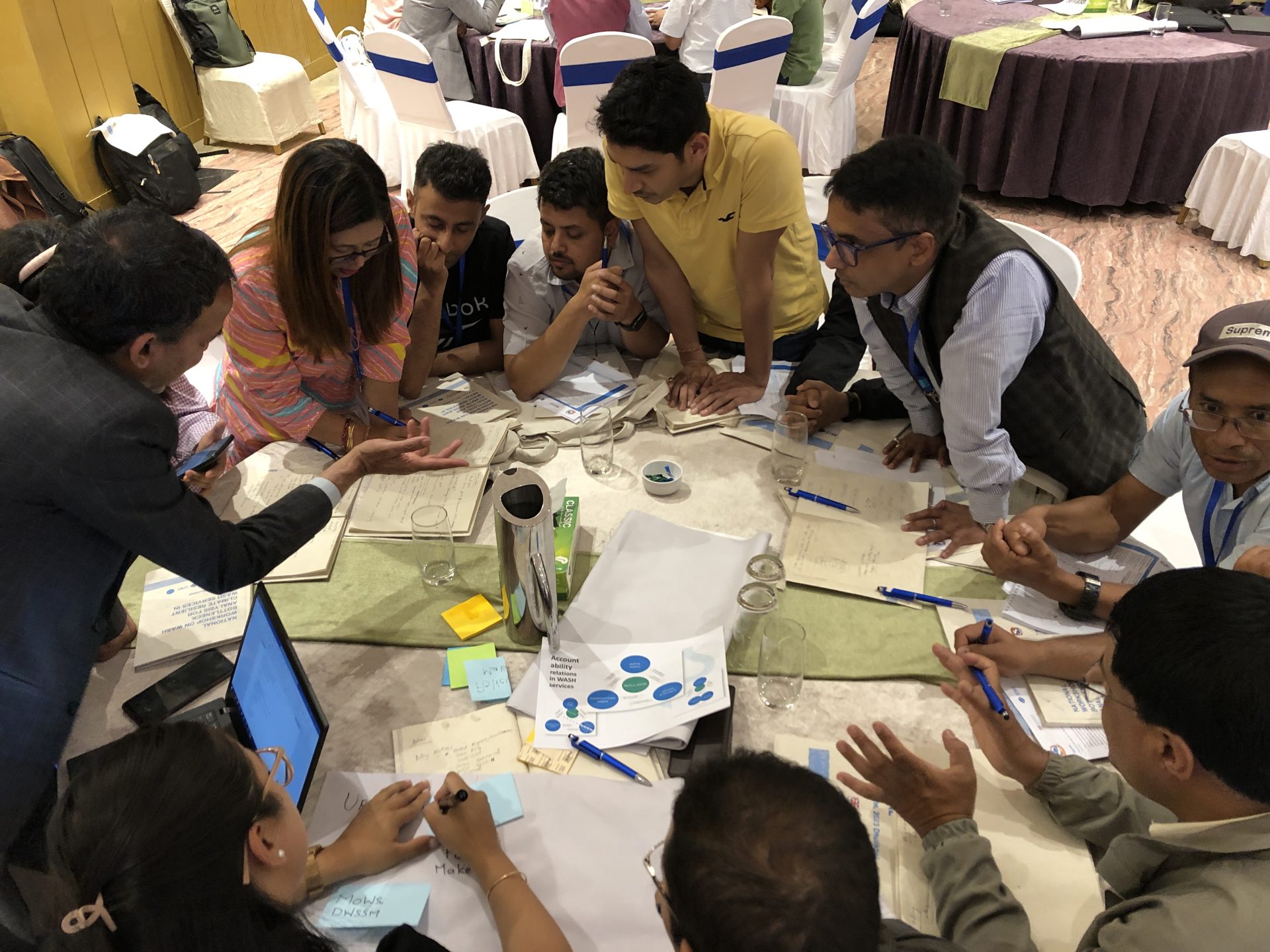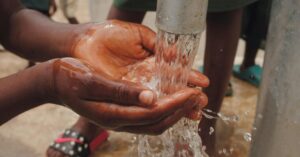- SIWI – Leading expert in water governance
- /
- Latest
- /
- A multistakeholder WASH workshop in Nepal
A multistakeholder WASH workshop in Nepal

In June 2023, SIWI was invited by the Government of Nepal together with UNICEF to moderate a multi-stakeholder workshop in Nepal, a Climate Risk-Informed WASH Bottleneck Analysis process.
Nepal has made progress in coverage of safely managed Water Sanitation and Hygiene (WASH) services. Despite this, serious challenges remain for the country to reach the SDG targets by 2030. This includes insufficient funding, limited evidence to base policies and programmes on, and social norms impacting negatively on WASH behaviours. These challenges are exacerbated by the vulnerability of the country to climate change induced risks to sustainable WASH services.
To address these challenges, the Government of Nepal together with UNICEF organised a Climate Risk-Informed WASH Bottleneck Analysis Tool process in 2023, with a milestone workshop, which took place in Dhulikhel at the Aagantuk Resort and Hotel between the 5th and 9th June 2023. Key WASH and climate sector stakeholders were present. These included government representatives, development partners, NGOs, academics and private sector. Participants focused on diagnosing key bottlenecks in WASH service delivery, including ways to improve climate resilient WASH based on the key climate risks facing the sector.
Based on this, six subsector Action Plans for sustainable and climate resilient WASH service delivery were developed, one for each of rural and urban water supply, rural and urban sanitation, and WASH in schools and health care facilities (HCF), respectively.
Participants demonstrated significant engagement during the workshop, through active interaction and positive and tailor-made contributions. Close to a 100 participants represented relevant stakeholders in the sector, ranging from service providers, government, environmental authorities, donors, NGOs to academia, among others. They displayed experience and commitment to the exercise, despite the challenging context for the sectors.
The climate risk assessment that informed the WASH BAT was undertaken with a methodology that combined a desk review together with several follow up workshops where a Climate Task Force consisting of key WASH and climate stakeholders had the opportunity to discuss and validate the results. The key hazards, exposure groups and vulnerabilities for Nepal were identified based on these prioritised risks. The workshop integrated a climate risk-informed component which was reflected in the activities developed for the Action Plans.
After four days of intense work, a consensus was reached by the different working groups in each of the sub-sectors regarding the climatic and environmental risks that affect the different sub-sectors analyzed.
The outcome
The WASH BAT implementation in Nepal was comprehensive in three distinct ways. Firstly, that it focused on water and sanitation at rural and urban level and WASH in schools and WASH in HCF, with the possibility to consolidate the exercises to get a national picture. Secondly, the process was informed by a climate risk analysis, resulting in a Risk-Informed WASH BAT. This way, the results reflected how to achieve climate resilient WASH. Thirdly, the workshop in Nepal brought WASH and climate change stakeholders around the table to discuss challenges but also opportunities.
At a national sector level, prioritised activities for climate resilient WASH services included:
- Improved political will and prioritisation, including evidence-based building of knowledge and skills.
- Improved coordination and dialogue between stakeholders from Federal, Provincial and local level (advocacy mechanism and bring together all agencies).
- Development of standards and guidelines for the construction of climate resilient infrastructure. Using national and global best practice examples and case studies.
- Capacity building on climate resilient WASH based on the standards and guidelines to ensure the sustainable delivery of climate resilient WASH services and local and provincial levels.
- Improved monitoring systems for utilities and private sector (using KPI) with incentives and cross subsidy package including capacity building.
- Improved accountability and regulation with the establishment of independent authority for regulation & tariff fixation.
The priorities constitute a qualitative contribution to Joint Sector Review process, obtained on a participatory basis and the result of dialogue between the main players in the sector, for national planning and for the various decentralized levels.
The need to be process oriented was also highlighted by senior officials, including the importance of linking Action Plans with national and international commitments. The Action Plans should also be seen as key inputs to any future updates to National Determined Contributions or National Adaptation Plan, as well as national policies and strategies for climate resilient WASH and projects and programmes for implementing the activities included in the Action Plan. Political prioritisation, awareness and leadership across the ministries and departments will be important in this endeavour, with champions advocating for climate resilient WASH.
A climate rationale was then developed by SIWI with the contribution of all WASH and Climate stakeholders.
Most recent

Strengthening the Board of Stockholm Water Foundation (SWF)
- Stockholm Water Prize
- Stockholm Junior Water Prize
- Youth and water
- World Water Week

Water is our future – but Sweden still lacks a comprehensive strategy
- Water and the 2030 Agenda
- Groundwater
- Agriculture and water
- Cities
- Disaster risks and water

SIWI-WASH experts join IVL

Transforming relations through WASH access

SIWI Amman and UNICEF host Libya representatives for WASH exposure visit




